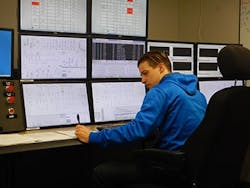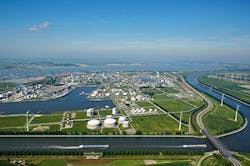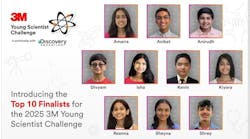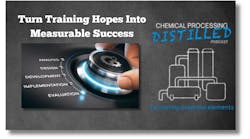Knowledge Transfer: Plants Seek The Right Recipe For Seasoning
Capturing knowledge that seasoned staff take for granted and transferring it effectively to new hires and inexperienced personnel remain urgent and ongoing challenges for the chemical industry. Fortunately, advances in technology and training are simplifying the tasks and boosting success, as the experiences of Rockwell Automation, the Center for Operator Performance (COP), Nova Chemicals and BASF show.
“According to a Deloitte study, by 2025, two million manufacturing jobs will go unfilled across the United States. So, as the workforce retires, it will become harder to transfer tribal knowledge without the proper technology and training services in place. This increases process variation and can potentially reduce asset utilization,” cautions Gordon Bordelon, global chemical industry technical consultant, Rockwell Automation, Greenville, S.C.
The average age of workers in U.S. manufacturing is 57.2 years and 22% of these workers will retire in the next six to eight years — making the workforce skills shortage even more critical, adds Brian Fortney, Mayfield Heights, Ohio-based global business manager, training services for Rockwell Automation. “For most chemical companies, they will have new operators coming into the plant, and they must figure out the best and most efficient ways to train them and transfer knowledge while maintaining safety — a key element in chemical plants,” he stresses.
One of the main challenges involves capturing key insights on the many chemical operations that traditionally — and in many cases still — lack full automation, says Bordelon.
Aspects typically not automated include startup and shutdown procedures, routine maintenance tasks, management of standard operating procedures (SOPs), and sample and quality checks, among others. Lack of automation, he notes, means there’s no standard and efficient way to capture the knowledge from the operators performing these tasks, especially when they retire (Figure 1).
Figure 1. Lack of full automation leads to difficulties in capturing crucial details about some operations. Source: Rockwell Automation.
In response, Rockwell Automation is deploying new technologies to help chemical customers with their knowledge transfer. For example, its distributed control system contains tools such as eProcedures that allow plant operators to capture SOPs in an electronic, automated, structured and standardized way. This provides repeatable instructions, making it easier for new operators to learn systems and procedures. It enables tracking manual operations for continuous improvement initiatives and also helps reduce human errors, improve product quality and consistency, and increase overall plant efficiencies.
“We worked with one specialty chemical paint producer to deploy a batch solution, standardized on eProcedures, to help standardize SOPs and drive more consistent operations for manual operations,” notes Bordelon.
The company also aids chemical makers in getting more from traditional training methods. For instance, its “train-the-trainer” technique helps to formalize knowledge transfer by using system and equipment subject matter experts to train new employees and the crews they work with on a regular basis. “This helps ensure knowledge is transferred and spread across multiple people versus just one person,” says Fortney.
Most chemical companies run lean, so having a baseline and documented standard process for knowledge transfer is essential, he notes. However, determining loss of tribal knowledge can be difficult. “Chemical companies measure success through asset utilization and fewer operator-induced incidents and safety events. Overall, with a standard, formal training process, the plant should experience less human-induced operating issues and optimized performance,” adds Bordelon.
The ongoing advance of analytics and machine learning should help plug holes in knowhow. “… If there are knowledge gaps or changes, the equipment will be able to pick up the slack through applied, scalable analytics and trending,” he believes.
Collaborative Efforts
The formation in 2007 of the Center for Operator Performance (COP), Dayton, Ohio, reflected an appreciation by the companies involved of the need to train operators faster and retain the knowledge about to walk out the door.
“However,” notes Dave Strobhar, chief human factors engineer, Beville Engineering, Dayton, Ohio, and a leading figure within the group, “COP projects have since highlighted that the knowledge capture of retiring employees is not easy and often not sufficient for use.”
For example, one project on mental models revealed that operators can have the necessary knowledge but fail to retrieve it when needed. So knowledge alone is insufficient; it must be structured for ease of access and application.
“Dr Gary Klein [a pioneer of cognitive psychology] has termed this inert knowledge. It existed, but it wasn’t put to use. This is consistent with other research by Klein that highlights the need for information to be in context to be useful. Data alone is insufficient,” explains Strobhar.
Another COP project on current training techniques used in industry highlights some of the difficulties in transferring information to the learner. Most of the eight companies participating relied on the so-called fire-hose approach, one that all the firms recognize as problematic. “This involves short periods of training, flowing data to the student, forcing them to do the equivalent of drinking from a fire-hose. It does quench the thirst but much ends on the ground. Several companies are shifting their focus to one of retention — not how much they transfer but how much the student retains,” adds Strobhar.
He also points to an industry survey of over 300 operators, engineers and supervisors that revealed the knowledge targeted for capture may not be the right information at all. Almost universally, the focus is on technical information related to how a system functions. “Critical ‘soft skills’ on communication, leadership and decision-making were being allowed to leave, while the focus was on what pump is connected to which vessel,” he notes.
Other COP projects have shown the real benefit provided by an expert doesn’t relate to how a system or equipment functions but rather to how it can fail. “In many attempts to capture the knowledge going out the door, the wrong questions were asked and the wrong knowledge was captured. Member companies are learning and now focusing on failure modes — but much was likely lost,” he concludes.
Industrial Use
One tool that began life as part of a COP project is ShadowBox training software. “ShadowBox is a helpful tool to capture knowledge and the structure leads the trainee through problem-solving steps and helps them to develop these skills,” says Ron Besuijen, E2 technical training specialist, Nova Chemicals, Calgary, Alberta.
The company has incorporated the software into the simulator training program for new panel operators at its Joffre site in Alberta, a complex that includes three ethylene and two polyethylene plants and has over 700 workers (Figure 2).
Figure 2. Software helps experienced operators break down steps in their thought processes, to ease knowledge transfer to trainees. Source: Nova Chemicals.
“The nature of tacit knowledge is that an experienced operator may not be aware of how they arrive at their solutions. For this reason, it can be difficult for them to communicate how they know the solutions to problems. The structure of ShadowBox helps an experienced operator break down the steps of their thought process and allows them to articulate them more effectively,” explains Besuijen.
The company also has used information and tools from the COP to help develop a troubleshooting course. Nova creates videos of problem scenarios with its own simulators and then plays these in a classroom setting. There, participants use voting software to answer questions posed by ShadowBox. A group discussion that follows explores how they arrived at their conclusions. This also provides an opportunity for the more-experienced operators to share their insights into the problem, he notes.
“Ultimately, the goal of training is to help people make better decisions. The decision may be to follow a procedure — but at times there may not be a procedure or the circumstances do not follow the procedure exactly and require some decisions to be made. ShadowBox is an effective tool to develop decision-making skills and to capture the tacit knowledge from experienced employees,” Besuijen adds.
Nova Chemicals also uses in its troubleshooting and technical leader courses at the Joffre site decision-making exercises (DMX) developed for the COP. These courses originally were based on U.S. Marine Corps tactical decision games.
“These are more scenario-based training exercises that encourage the trainee to think through real-life problems and develop problem-solving skills. Traditional training is focused on writing tests and demonstrating task. Although these are important first steps, employees will be faced with challenging situations that will require them to solve real-world problems. ShadowBox and DMX provide them with the tools to accomplish this,” he concludes.
Long-Running Initiiative
For nearly a decade now, BASF, Ludwigshafen, Germany, has made knowledge management and transfer a central pillar of an initiative called “Optimizing Production in Antwerp and Ludwigshafen into the 21st Century” (OPAL21).” This aims to achieve operational excellence at all production facilities in these two, large, integrated sites and create templates for other sites to follow (Figure 3).
“The knowledge and experience of our employees is a key success factor for BASF, and OPAL21 serves to achieve continuous improvement in production,” says a spokeswoman.
Members of the OPAL21 team analyze existing processes and plants, and then identify potential improvements in production processes. “Continuous improvement in production is ultimately an ongoing task, the fixed components of which include systematic operational qualification, knowledge management and lifelong learning,” she notes.
Figure 3. Knowledge management is central to a long-running initiative at major production site in Antwerp, Belgium. Source: BASF.
BASF’s knowledge management concept combines several different approaches.
One is a series of onboarding programs within the sites’ plants. These are function-specific and involve working with specialist mentors.
A second is an operational qualification system to further promote efficient onboarding together with development through independent learning. An electronic qualification matrix that helps individuals plan, manage and improve their operational qualifications underpins this. Because the matrix contains detailed and structured information about each role, it also allows BASF to get replacements quickly into position when personnel move between different plants or retire.
“Operational executives are supported in a unit-specific manner by processes for knowledge identification and knowledge retention. As part of the so-called knowledge documentation check, we look at the knowledge that can be documented — the explicit knowledge. With the help of our knowledge transfer check, we identify the existing empirical knowledge — the implicit knowledge,” adds the spokeswoman.
Seán Ottewell is Chemical Processing's Editor at Large. You can email him at [email protected].






